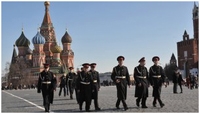Netflix and Hulu set sights on Russia

Online video service providers are tapping up Russian content owners with a view to launching OTT (Over The Top) services there. This follows Russia’s accession to the World Trade Organization in Dec. 2011, which will make it easier for foreign service providers, especially in OTT, to enter the Russian TV and Video On Demand (VOD) arena.
Netflix and Hulu are among the early movers, having recently sent senior staff to Russia for negotiations with local content providers, looking at possible partnerships, but also to assess the likely demand for their services across the country. Given their obvious dearth of Russian language content, both Netflix and Hulu want partnerships with local providers, although there is also demand for U.S. blockbuster content with subtitles or dubbed into Russian.
Apart from Russia joining the WTO, Netflix and Hulu are attracted by the country’s fast expanding and improving Internet infrastructure, funded by its vast oil and gas revenues. This is fuelling rapid growth in Internet usage, with the online audience expected to reach 93 million by 2013 according to GP Bullhound, the UK-based international technology focused investment bank. This would be a penetration rate of 67 percent, about the same as leading European Internet nations such as France at 69 percent, Germany on 75 percent, and the UK on 76 percent. Most importantly, there has been rapid growth in the number of broadband connections fast enough for good quality OTT services, from 13.5 million in the third quarter of 2010 to 19.4 million by Q3 2011, according to the Internet technology research firm Point Topic. This has already been reflected in significant IPTV growth, with Russia leaping into the world’s top 10 for the first time in 2011, ending the year in eighth place after doubling the number of subscribers to almost one million.
This, combined with the WTO membership, makes Russia ripe now for OTT services. Russia’s WTO membership came after 18 years of negotiation that began almost immediately after the collapse of the old Soviet regime. Various obstacles had been progressively removed, but then Russia’s short but bloody war with Georgia in 2008 provided a final stumbling block. This was eventually removed when relations between the two countries thawed a little, and Georgia ended its opposition to Russia’s WTO membership.
Russia was the last major economy to join the 153 State global trade body after China’s accession in 2001. The removal of trade barriers is likely to stimulate and diversify trade between Russia and the rest of the world, and boost its already booming economy by several billion dollars.
Get the TV Tech Newsletter
The professional video industry's #1 source for news, trends and product and tech information. Sign up below.
